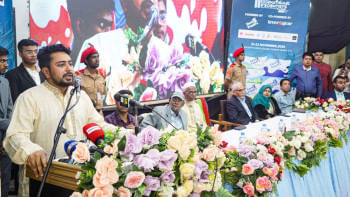The last of the Koras

They took part in laying rail tracks -- one of the primary infrastructural backbones of the country. Several of them fought for the country’s independence in 1971.
Yet their properties, livelihood and life are threatened by influential locals, who prefer to identify them as “outsiders”.
These “outsiders” are in fact citizens of our country. They are called the Koras.
Brought from Jharkhand to Dinajpur region during the last half of the 19th century by the British Raj to lay rail tracks, a good number of the timid but hardworking Koras settled in a remote area in Jhinaikuri village under Haljay mouza of Biral upazila, according to Saleq Khokon, a writer and researcher of small ethnic communities in the country.
There used to be a vibrant locality, now known as Korapara, where thousands of Koras used to live. Before Bangladesh won Independence in 1971, around 200 Kora families lived in Korapara.
Then began the sharpest decline in the Kora population and as of date, only 21 of Kora families still live in the area.
Asked about the factors that are contributing to the decline in the Kora population, Saleq said a few of the factors include their simple and ordinary lifestyle, inaccessible locality as well as failure of different governments in disseminating education and other basic services among the community.
Their unique language, faith and custom are other factors that alienated them from the mainstream societies. Especially, their custom of marrying only within their own caste refrained them from achieving financial security through integration into the mainstream Hindu societies in the country. However, this custom might have ultimately saved the community from disappearing from the face of the earth.
Deprived of any coverage under the social security programmes of the government, the uneducated and jobless Koras are now a marginalised community that is on the brink of extinction for the remainder of the inherited land they still possess, said Saleq.
Three Kora youths -- Kina Kora, Thopal Kora and Satal Kora -- fought for this land during the Liberation War in 1971, but the entire community of the Koras is now fighting for the own passed down land in this sovereign country, lamented a few elderly Koras.
Urging the government to create jobs for the Koras’ survival, freedom fighter Kina Kora said they now live from hand to mouth, working as day labourers for less than the standard minimum wage at agricultural farms surrounding Korapara. “The members of family go unfed when there’s no work.”
A young resident named Krishna Kora said persecuted and intimidated by “the powerful”, around 30 Kora families left for India in the last 15 years. “Influential locals including Kamruzzaman of Haljay village and nine others forcefully occupied 40 acres our land years ago.”
According to British land records of 1943, the Koras owned 55 acres of land, but the community now possesses only 15 acres.
They are still being persecuted for this meagre amount of land, Krishna said, alleging that Kamruzzaman has created an atmosphere of intimidation by filing two cases against 25 Koras and on March 6 last year, he and his goons in an attack injured 10 Koras. “Of them, six had to be hospitalised. The attackers didn’t even spare the children.”
Sonia Kora, an elderly resident of Korapara, said the Kora population is falling fast due to intimidation of the influential encroachers of their land.
Since the attack on them last year, four more Kora families left the country, she also said.
During a recent visit to Korapara, 21 Kora families were found living in thatched shanties, without any toilet facility, on nearly 50 decimals of land. For drinking water, they now rely on a tube well that was installed only recently by a non-governmental organisation.
On November 23, 2019, when asked about the March 6 attack on the Koras, allegedly under his leadership, Kamruzzaman claimed that he was not aware of any such attack on them.
He further claimed that in 1987, his father purchased 65 decimals of land in Korapara.
Golam Rasul, who was recently transferred from his officer-in-charge post at Biral Police Station, said following filing of a case by Krishna Kora over the March 6 attack, police submitted charge sheet with a local court, accusing Kamruzzaman and three others.
Rabindranath Soren, president of Jatiya Adivasi Parishad, urged the government to take immediate steps for saving the Koras of Dinajpur from going extinct.


 For all latest news, follow The Daily Star's Google News channel.
For all latest news, follow The Daily Star's Google News channel. 



Comments